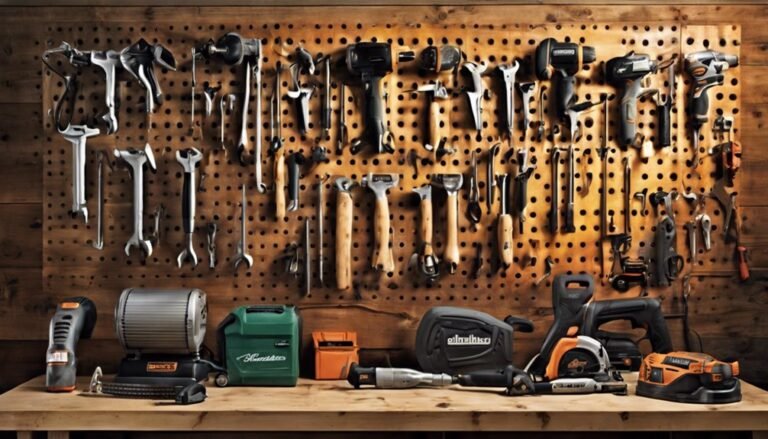Heavy-Duty Storage Hooks for Warehouses
Heavy-duty storage hooks are vital for warehouses aiming to optimize space and improve workflow. They help you utilize vertical storage, freeing up ground space for other tasks. When selecting hooks, consider load capacity, material strength, and installation layout for efficiency. Regular maintenance guarantees longevity and safety by preventing wear and tear. By understanding your specific storage needs, you can enhance your warehouse’s organization and productivity. Discover more about the types and features of these essential tools.
Benefits of Heavy-Duty Storage Hooks
Heavy-duty storage hooks offer numerous advantages that can transform your organization game. By utilizing these hooks, you can achieve significant space optimization in your warehouse or workshop. They allow you to hang tools, equipment, and materials off the floor, freeing up valuable ground space for other uses. This vertical storage solution is essential for effective industrial organization, enabling you to access items quickly and efficiently. You’ll find that implementing heavy-duty storage hooks not only enhances accessibility but also reduces clutter, creating a safer work environment. With the right hooks, you can maximize your space‘s potential, giving you the freedom to operate seamlessly. Embrace this practical solution to elevate your workspace and streamline your operations for better productivity.
Key Features to Consider
When choosing heavy-duty storage hooks, you need to assess the load capacity requirements to make certain they can handle your items. Additionally, consider the material durability standards to assure long-lasting performance. These key features will help you select the right hooks for your storage needs.
Load Capacity Requirements
Understanding load capacity requirements is essential for selecting the right storage hooks for your needs. You’ll want to verify your hooks can handle the intended weight safely. Consider the following key factors when evaluating load capacity:
- Load Testing: Confirm hooks have been rigorously tested for weight limits.
- Weight Distribution: Always check how the weight will be distributed across the hooks to prevent overload.
- Safety Margins: Opt for hooks rated above your maximum expected load to accommodate sudden shifts.
Material Durability Standards
To guarantee maximum efficiency and longevity, it is crucial to take into account the material durability standards of storage hooks. Ascertain the hooks undergo rigorous material testing to confirm they can withstand heavy loads without warping or breaking. Look for materials like high-grade steel or reinforced polymers, which offer superior load performance and resistance to corrosion. Durability isn’t just about strength; it also entails resistance to environmental factors such as humidity or temperature fluctuations that can weaken the structure over time. When selecting hooks, prioritize those that meet industry standards for safety and reliability. This attention to material durability will not only enhance the lifespan of your storage solutions but also ascertain the safety of your stored items.
Types of Heavy-Duty Storage Hooks
When selecting heavy-duty storage hooks, you’ll want to contemplate both the material and load capacity ratings. Different materials, like steel or plastic, offer varying levels of durability and resistance to wear. Understanding load capacity is essential to guarantee the hooks can safely support your intended items.
Hook Material Options
Choosing the right material for heavy-duty storage hooks is essential for ensuring durability and performance. You’ll primarily encounter steel and aluminum options, each with distinct advantages. Steel hooks are robust and ideal for heavy loads, while aluminum hooks offer lighter weight and resistance to corrosion.
Consider these material options:
- Steel: Exceptional strength, perfect for demanding environments.
- Aluminum: Lightweight and corrosion-resistant, suitable for moderate loads.
- Plastic hook alternatives: Useful for lighter items and environments needing less harshness.
When selecting your hooks, weigh the benefits of steel vs aluminum based on your specific storage needs. Don’t overlook plastic hooks for lighter applications, as they can provide a practical solution without compromising on versatility.
Load Capacity Ratings
Understanding load capacity ratings is essential for selecting the right type of heavy-duty storage hooks. These ratings indicate the maximum weight a hook can safely hold, which is critical for maintaining safety and efficiency in your workspace. When choosing hooks, consider the results of load testing, as they provide a reliable measure of strength. Proper weight distribution is also important; evenly spreading the load reduces stress and enhances stability. Different hooks may have varying capacities based on their design and material, so be sure to match the hook type with your specific storage needs. By carefully evaluating load capacity ratings, you can guarantee your heavy-duty storage hooks meet your demands while maximizing available space.
How to Choose the Right Storage Hooks
How do you determine which storage hooks best suit your needs? Choosing the right storage hooks involves evaluating several factors to optimize your warehouse organization. Consider these key points:
- Load Capacity: Confirm the hooks can safely support the weight of the items you plan to store.
- Storage Hook Styles: Different styles, like J-hooks or double hooks, cater to various items and space configurations.
- Material Quality: Opt for durable materials like steel to withstand heavy use and prevent bending or breaking.
Installation Tips for Maximum Efficiency
To maximize efficiency when installing heavy-duty storage hooks, start by evaluating the layout of your storage space. Consider your hook placement strategies to guarantee ideal use of vertical space. Utilize installation tools like drills and stud finders for precise placements.
Here’s a quick reference table for effective installation:
| Hook Placement Strategy | Recommended Installation Tool |
|---|---|
| Vertical Alignment | Drill |
| Horizontal Spacing | Level |
| Weight Distribution | Stud Finder |
Safety Considerations for Heavy-Duty Storage Hooks
After guaranteeing your heavy-duty storage hooks are installed correctly, it’s important to address safety considerations to prevent accidents and injuries. Following safety regulations not only protects your team but also enhances overall efficiency. Here are key points to keep in mind:
- Guarantee hooks are rated for the weight they’re supporting.
- Regularly inspect for signs of wear or damage.
- Maintain clear pathways to avoid accidental collisions.
Maintenance and Care for Longevity
While proper installation is crucial, regular maintenance and care are essential for ensuring the longevity of your heavy-duty storage hooks. Implementing effective maintenance practices can prevent rust and degradation. Routinely inspect hooks for signs of wear, such as cracks or corrosion. Clean them with a mild detergent and water to remove dirt and grime, then dry thoroughly to prevent moisture buildup. Additionally, apply a protective coat of rust-inhibiting spray periodically. Use care techniques like avoiding overloads and distributing weight evenly to minimize stress on the hooks. Remember, proactive maintenance not only extends their life but also enhances safety in your workspace. By adopting these simple practices, you’ll enjoy a more reliable and efficient storage solution.
References
- https://www.osha.gov/SLTC/warehousing/index.html
- https://www.cdc.gov/niosh/docs/2006-118/pdfs/2006-118.pdf
- https://www.wbdg.org/resources/warehousing
- https://www.safetyandhealthmagazine.com/articles/19682-behind-the-scenes-of-warehouse-safety
- https://www.nist.gov/news-events/news/2021/03/smart-warehouse-technology-helping-industries-respond-covid-19
- https://www.sciencedirect.com/science/article/pii/S2351978921003948
- https://www.fmlink.com/articles/warehouse-safety-best-practices/







